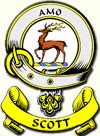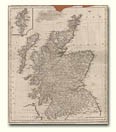 Although many of us do not share the name Scott, we share the privilege of being part of the Scott clan. Traditionally, the family unit was the most important bond that drew people together. In the twentieth century, we have the ability to travel around the globe with relative ease; however, our ancestors generally lived and died in the same parish in which they were born, and likely the same parish in which their parents were born, and so on. It is that traditional geographic stability that makes the name Scott so interesting.
Although many of us do not share the name Scott, we share the privilege of being part of the Scott clan. Traditionally, the family unit was the most important bond that drew people together. In the twentieth century, we have the ability to travel around the globe with relative ease; however, our ancestors generally lived and died in the same parish in which they were born, and likely the same parish in which their parents were born, and so on. It is that traditional geographic stability that makes the name Scott so interesting.
I must point out that the etymology of Scottish surnames is relatively simple. People were known by their profession (Butler, Smith); a descriptive or a nick name (eg. a physical characteristic, in Gaelic Campbell means crooked mouth and Rufus means the red, a local place or feature (Logan, Brook); the surname or title of their land lord, and sons would sometimes take the Christian name of their father as their surname (MacDonald “of Donald” or Davidson “son of David”). Often travellers took the name of their village or farmstead, depending on how far they went, which is where the Scotts come in.
If we consider the characteristic methods of creating or adopting surnames, the origin of the name Scott seems fairly obvious. It seems probable that the name Scott has something to do with Scotland. That leaves one to ask: "was Scotland named after us, or were we named after it?". The answer is complicated, and it requires a brief outline of late Roman/early medieval British history.
 During Roman occupation of England and Wales, the "inhospitable land of the barbarians" north of Hadrian's Wall was known as Caledonia. The Roman forces withdrew from Britain in AD 410, and Caledonia was re‑named after the dominant Celtic tribe that inhabited the area along the English border: Land of the Scots or Scotland. At that time, Britain was inhabited by various distinct groups: Angles, Saxons, Normans, Picts, Jutes, Danes and Scots.
During Roman occupation of England and Wales, the "inhospitable land of the barbarians" north of Hadrian's Wall was known as Caledonia. The Roman forces withdrew from Britain in AD 410, and Caledonia was re‑named after the dominant Celtic tribe that inhabited the area along the English border: Land of the Scots or Scotland. At that time, Britain was inhabited by various distinct groups: Angles, Saxons, Normans, Picts, Jutes, Danes and Scots.
Uchtredus filius Scotus is the our first recorded ancestor and he witnessed Royal Charters between AD 1107 ‑ 1128. His name literally means Uchtred, son of the Scot. It has been noted that Scott was a name more common in Northumberland than in Scotland because if Uchtred had returned to Scotland, he would almost certainly not be known by that name (as most men were sons of Scots) and was perhaps known as Uchtred Miller or Uchtred Smith.
It is from Uchtredus filius Scotus that we see the emergence of the first Scott lines. From his two sons descended the Scotts of Balweary (Fife) and the Scotts of Buccleuch (Selkirk). Michael Scott of Balweary (1175 ‑ 1234), known throughout Europe as "The Wizard" for his study of magic, was also a mathematician and a physician. After the death of King Alexander III in 1286, Sir Michael Scott of Balweary (a direct descendant of "The Wizard"), was entrusted with the honour to retrieve the heir to the Scottish throne, Margaret the "Maid of Norway".
The chronicles of the Scott clan mushroom from the two lines, Balweary and Buccleuch. By the early fifteenth century, their control of the border land was virtually unequalled. The Scotts began in recorded history as a literate, respected and influential family and were given numerous Noble titles (Duke, Earl, Baron) as well as numerous knighthoods.
It appears that the respectability continued, with minor exceptions such as Walter Scott of Harden (d. 1629) who was a notorious thief and cattle rustler. His reputation is saved by one of his direct descendants, Sir Walter Scott (1771 ‑ 1832), poet and novelist, historian and folklorist, and propagator of much of the Highland tartan image. The Scott name has worked its way all over the world. In Lithuania and Germany the ordinary word for a peddler is derived from the name Scott, as a result of their trading monopoly in the eighteenth century.
The Scott family has also had its share of nobility, poets and cattle thieves in the past, but history is not a thing of the past; the history of the Scott family is an ongoing process. Every one of us is contributing to the history of the Scott family.
Scott, not just a name, but a family.
